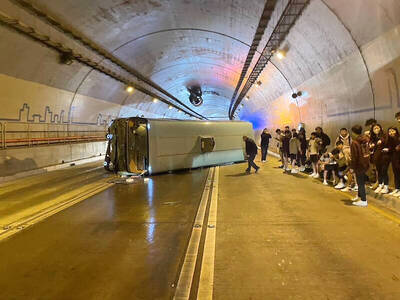A contractual error is the main reason there has been a shortfall in the sports lotteries revenue, but the lotteries still have the potential to earn more money, an analyst said yesterday.
Taiwan Sports Lottery Corp, run by Taipei Fubon Bank, asked the government on Feb. 8 to allow it to halve the contracted amount of revenue it must give the treasury because sales were lower than forecasted. It attributed the slow sales to a delay in launching the lotteries, a change made to regulations governing its issuance and the global financial crisis.
“Given the current regulations, the sports lotteries are doomed to be non-profitable for operators,” said Griffey Chang, a sports lotteries analyst who breaks down game odds daily for betters. “It’s not that there’s no market for sports betting in Taiwan. On the contrary, there has been a huge underground betting market for years.”
One crucial factor was the government’s request that the Taiwan Sports Lottery submit the annual revenue by a fixed-rate portion of “expected sales” rather than “actual sales.”
The contract specifies that Taipei Fubon Bank must pay NT$20.83 billion (US$652 million) over six years, an average of NT$3.47 billion a year.
The bank had forecast sales would reach NT$33.65 billion from 2008 to last year, but the actual sales were NT$19.1 billion — 56.8 percent of expected sales.
The large amount of forecast revenue had forced the bank to add it as an operating cost and bookmakers to lower the game odds, making the lotteries unappealing for consumers, who ended up betting with underground operators, Chang said.
The other problem affecting sales was that betters cannot bet on single games because of fears this could lead to game-fixing. This means local professional baseball games are bundled with US Major League (MLB) games, which means betters have to correctly predict the outcomes of several local and MLB games to win.
“The design discourages betters who don’t follow foreign sports or do not read English,” Chang said.
The creation of the sports lotteries, however, has turned more people into sports fans, he said. Over time, the lotteries will have a positive impact on local sports by bringing in more fans as well as providing the sports federation with revenue, he said.
Taiwan Sports Lottery has a six-year contract to run the lotteries, from 2008 to 2013.

The Central Weather Administration (CWA) today issued a "tsunami watch" alert after a magnitude 8.7 earthquake struck off the Kamchatka Peninsula in northeastern Russia earlier in the morning. The quake struck off the east coast of the Kamchatka Peninsula at 7:25am (Taiwan time) at a depth of about 19km, the CWA said, citing figures from the Pacific Tsunami Warning Center. The CWA's Seismological Center said preliminary assessments indicate that a tsunami could reach Taiwan's coastal areas by 1:18pm today. The CWA urged residents along the coast to stay alert and take necessary precautions as waves as high as 1m could hit the southeastern

The National Museum of Taiwan Literature is next month to hold an exhibition in Osaka, Japan, showcasing the rich and unique history of Taiwanese folklore and literature. The exhibition, which is to run from Aug. 10 to Aug. 20 at the city’s Central Public Hall, is part of the “We Taiwan” at Expo 2025 series, highlighting Taiwan’s cultural ties with the international community, National Museum of Taiwan Literature director Chen Ying-fang (陳瑩芳) said. Folklore and literature, among Taiwan’s richest cultural heritages, naturally deserve a central place in the global dialogue, Chen said. Taiwan’s folklore would be immediately apparent at the entrance of the

“China is preparing to invade Taiwan,” Deputy Minister of Foreign Affairs Francois Wu (吳志中) said in an exclusive interview with British media channel Sky News for a special report titled, “Is Taiwan ready for a Chinese invasion?” the Ministry of Foreign Affairs said today in a statement. The 25-minute-long special report by Helen Ann-Smith released yesterday saw Sky News travel to Penghu, Taoyuan and Taipei to discuss the possibility of a Chinese invasion and how Taiwan is preparing for an attack. The film observed emergency response drills, interviewed baseball fans at the Taipei Dome on their views of US President

Speeding and badly maintained roads were the main causes of a school bus accident on a rainy day in Taipei last year that severely injured two people and left 22 with minor injuries, the Taiwan Transportation and Safety Board said. On March 11 last year, a Kang Chiao International School bus overturned inside the Wenshan Tunnel (文山隧道) on the northbound lane of the Xinyi Expressway. The tour bus, owned by Long Lai Co, exceeded the speed limit after entering the tunnel, the board’s investigation found. Sensing that the rear of the vehicle was swaying, the driver attempted to use the service and exhaust